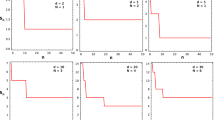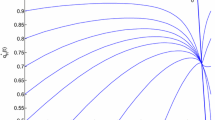Abstract
In game theory, an Evolutionarily Stable Set (ES set) is a set of Nash Equilibrium (NE) strategies that give the same payoffs. Similar to an Evolutionarily Stable Strategy (ES strategy), an ES set is also a strict NE. This work investigates the evolutionary stability of classical and quantum strategies in the quantum penny flip games. In particular, we developed an evolutionary game theory model to conduct a series of simulations where a population of mixed classical strategies from the ES set of the game were invaded by quantum strategies. We found that when only one of the two players’ mixed classical strategies were invaded, the results were different. In one case, due to the interference phenomenon of superposition, quantum strategies provided more payoff, hence successfully replaced the mixed classical strategies in the ES set. In the other case, the mixed classical strategies were able to sustain the invasion of quantum strategies and remained in the ES set. Moreover, when both players’ mixed classical strategies were invaded by quantum strategies, a new quantum ES set was emerged. The strategies in the quantum ES set give both players payoff 0, which is the same as the payoff of the strategies in the mixed classical ES set of this game.














Similar content being viewed by others
Notes
Quantization here refers to “deriving a quantum version of a classical algorithm”, which is different from “the process of converting analog to digital signals” that is more popular in the wider scientific community.
The \(\bar{a}\) defines complex conjugate of \(a\).
The \(\dagger \) notion defines Hermitian conjugate.
References
Dirac, P.A.M.: Quantum Mechanics. Clarendon Press, Oxford (1958)
Eisert, J., Wilkens, M., Lewenstein, M.: Quantum games and quantum strategies. Phys. Rev. Lett. 83(15), 3077–3080 (1999)
Flitney, A.P., Abbott, D.: Quantum version of the Monty Hall problem. Phys. Rev. A 65, 062381 (2002)
Hofbauer, J., Sigmund, K.: The Theory of Evolution and Dynamical Systems. Cambridge University Press, Cambridge (1988)
Holland, J.H.: Adaptation in Natural and Artificial Systems. MIT Press, Cambridge (1975)
Iqbal, A., Toor, A.H.: Evolutionarily stable strategies in quantum games. Phys. Lett. A 280(5–6), 249–256 (2001)
Kay, R., Johnson, N.F., Benjamin, S.C.: Evolutionary quantum game. J. Phys. A Math. Gen. 34, L547–552 (2001)
Marinatto, L., Weber, T.: A quantum approach to static games of complete information. Phys. Lett. A 272, 291–303 (2000)
Maynard Smith, J.: Evolution and the Theory of Games. Cambridge University Press, Cambridge (1982).
Meyer, D.A.: Quantum strategies. Phys. Rev. Lett. 82, 1052 (1999)
Miszczak, J.A., Gawron, P., Puchala, Z.: Qubit flip game on a Heisenberg spin chain. Quantum Inf, Process (2011)
Nash, J.F.: Equilibrium points in N-person games. In. Proceedings of the National Academy of Sciences USA, 36, 48–49 (1950)
Nawaz, A., Toor, A.H.: Evolutionarily stable strategies in quantum Hawk-Dove game. Chin. Phys. Lett. 27(5) (2010).
Nielsen, M., Chuang, I.: Quantum Computation and Quantum Information:10th Anniversary Edition. Cambridge University Press, Cambridge (2011)
Thomas, B.: On evolutionarily stable sets. J. Math. Biol. 22, 105–115 (1985)
von Neumann, J.: Mathematical Foundations of Quantum Theory. Princeton University Press, Princeton (1955)
von Neumann, J., Morgenstern, O.: Theory of Games and Economic Behavior, 3rd edn. Princeton University Press, Princeton (1953)
Zurek, W.H.: Quantum Darwinism. Nat. Phys. 181–188 (2009).
Acknowledgments
Tina Yu would like to thank Institute of Physics, Academia Sinica, Nankang, Taipei, Taiwan for their support during her visit working on the paper.
Author information
Authors and Affiliations
Corresponding author
Rights and permissions
About this article
Cite this article
Yu, T., Ben-Av, R. Evolutionarily stable sets in quantum penny flip games. Quantum Inf Process 12, 2143–2165 (2013). https://doi.org/10.1007/s11128-012-0515-3
Received:
Accepted:
Published:
Issue Date:
DOI: https://doi.org/10.1007/s11128-012-0515-3




